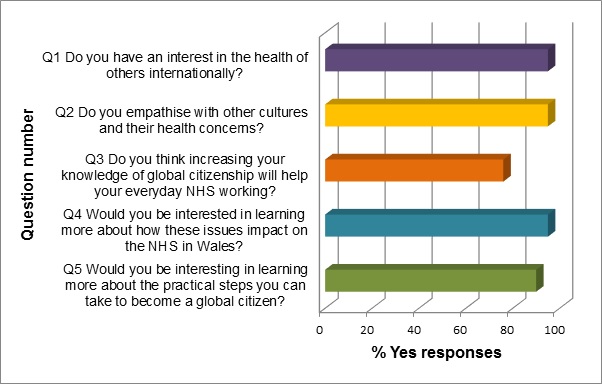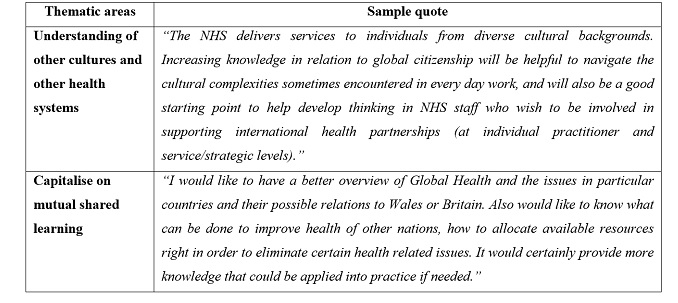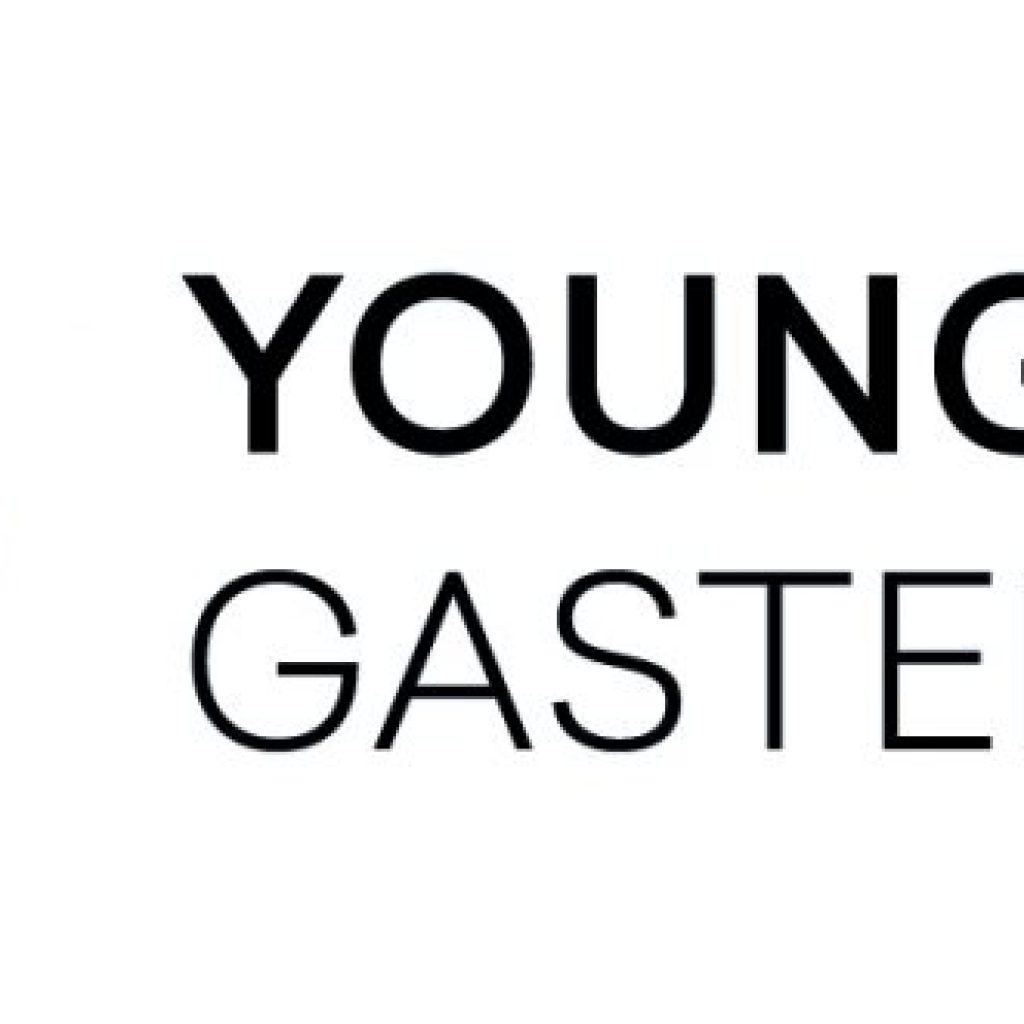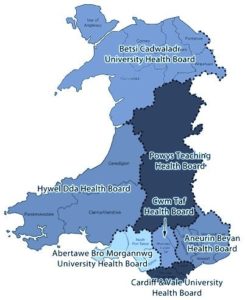meaning it can act autonomously from the central government, although international development is not a devolved area. Welsh Government (WG) have a role to promote and protect the interests of Wales within the UK, Europe and internationally. Working with interests and partners in Wales and beyond WG undertake activities to raise the profile and influence of Wales as a place to live, visit, study and do business. The NHS in Wales is divided into 10 areas, 7 Health Boards with a local focus, and 3 Trusts (HB/Ts) with a national responsibility.
Policy Context
The IHCC was established in response to the WG policy ‘Health Within and Beyond Welsh Borders: An Enabling Framework for International Health Engagement’ and has an all-Wales NHS responsibility covering a package of activities around international health engagement, strategically and technically managed within Public Health Wales. This arrangement has proven effective, efficient and successful in achieving the IHCCs objectives and outcomes. Moreover, it has the added value of combining national and international work and supporting networks for improving population health and wellbeing, reducing inequalities, achieving sustainable development and promoting global responsibility across Wales, a common goal for Welsh Government and NHS Wales. Part of this package of work includes exploring the Global Citizenship agenda.
Global Citizenship (GC) also referred to as World Citizenship, sits under the Sustainable Development agenda. It promotes the idea of valuing the importance of other cultures and diversity; valuing the environment and understanding we live in a connected world; the development of awareness raising; and training resources and activities. These link to the IHCCs strategic aim to:
“Improve knowledge, understanding and use of international policies, evidence and good practice to improve health and wellbeing, reduce inequalities and support sustainable development and global citizenship in Wales through delivery of two briefings and two engagement/training initiatives.”
It also supports our strategic work regarding the Charter for International Health Partnerships in Wales, which each HB/T pledged to implement. The Charter has been developed in recognition of the important need for a more coherent and consistent approach to international partnerships. It aims to strengthen sound governance, reciprocal partnership, organisational responsibility and good practice in international health across all HB/Ts.
In the wider policy context there is a strong connection to the unique Welsh legislation, the Well-being of Future Generations (Wales) Act 2015. The Act is part of Wales’ contribution to the United Nations (UN) Sustainable Development Goals (SDGs), in this instance of particular relevance are SDG#17 (Global Partnership and Cooperation) and SDG#3 (Good Health and Wellbeing). It has four relevant priority areas – ‘a globally responsible Wales’, ‘a more prosperous Wales’, ‘a more equal Wales’ and ‘a healthier Wales’, feeding into the international health agenda.
Purpose and Methods
There are currently no obvious resources for health professionals around the GC agenda, despite the skills development such training could bring. A course of this nature would be somewhat unique in the NHS, but has the added benefit of increasing awareness of the value of engaging internationally, and could act as a platform for those interested in international health partnerships to better understand why engagement is important.
Existing training material not specific to health professionals is in use, for example through third sector organisations such as the Council for Education in World Citizenship, the schools arm of the Welsh Centre for International Affairs and also Oxfam Cymru.
A scoping exercise was conducted to gather staff opinion and interest in international and global health issues and to determine the interest in and appropriateness of further activities on GC. A short online questionnaire was circulated to each HB/T. Each question consisted of an open and closed section, enabling participants to elaborate where they felt appropriate. Participants had four weeks to complete the questionnaire.
Results
The GC scoping questionnaire generated 81 responses over the four week period. Participants represented a wide range of staff groups across the NHS, including Planning and Estates, Corporate, Physiotherapy, Cardio respiratory, Pharmacy, Microbiology, Urology and Occupational Health.
Participants clearly demonstrated an appetite for learning more about the GC agenda (Figure 1). Participants indicated they had a strong interest in the health of those living in other countries. The answers also indicated a high level of empathy and responsibility to the health issues of those from other nations and its link to the NHS with a 95% positive response rate. The strongest theme identified was that a GC course would be of benefit, as it would help in providing a greater understanding of the perspectives of those who are using NHS services. There was also a strong recognition of the potential to share learning and improve ways of working, which confirms the potential for further events and workshops around GC and international collaboration in line with the Charter.

Figure 1. Participants’ responses to questions 1 to 5
Table 2 highlights the two most prevalent thematic responses from participants in the questionnaire. Participants demonstrated an understanding of the importance of the GC concept with regards to the wider cultural and socio-economic determinants of health and wellbeing in Wales.
A minimal number of respondents did not to see the relationship between GC and its relevance to NHS staff. In cases where the relationships between GC and NHS staff were unclear, action is needed to highlight the relevance and potential benefit with a particular focus on ensuring uptake from groups who may be harder to reach. The main risks identified in taking the work forward are around time and resources constraints.

Table 2 Thematic summary of responses to question 3 ‘Do you think increasing your knowledge of global citizenship will help your everyday NHS working?‘
The IHCC scoping questionnaire demonstrated an appetite for Global Citizenship training within the NHS in Wales, including gathering information on the delivery method participants would like to see the course take. Such a course would enhance learning, understanding of and empathy for those living in Wales as well as abroad. It would also increase understanding of the importance of strengthening health systems; international relations; global and environmental responsibility; and sustainable development and how these are linking to and defining population health and wellbeing.
As a result of the scoping questionnaire, and in order to respond to the identified need for GC training, the IHCC has developed a project proposal which will give Welsh health professionals a basic understanding of the concept of Global Citizenship and Sustainable Development, highlighting the relevance to their role and how it links with their organisation’s responsibility in regards to the WBFGA and the implementation of the Charter for International Health Partnerships. This training will be part of the standard package of training available to NHS staff, provided on an optional basis. The next step is to develop a working group to focus on the development of the training material, bringing in relevant stakeholders and those with experience in this area.
Interesting websites
- www.internationalhealth.wales.nhs.uk – This website will contain updates on the development of training material.
- www.publichealthwales.wales.nhs.uk/ – This website provides information on Public Health in Wales.
- www.wcia.org.uk/about.html – This website is useful for those who would like to find out more about exisiting course materinal.

Citation:
Ellis, Lauren/ Ward, Malcolm/ Besnier, Elodie: Global Citizenship Training in the Welsh NHS (In: Polak, G. [ed.]: GI-Mail 06/2016, ISSN: 2312-0827 Going International, Vienna 2016)
Here you can download this publication.
Published in GI-Mail 06/2016 (English edition).
- Do you already know our monthly newsletter GI-Mail with useful tips on postgraduate courses?
Sign up here. - Are you looking for vacancies or new career challenges? Here you will find the latest vacancies and job offers.
- Are you interested in up to date postgraduate courses and CME? In our education database »medicine & health« you will find new education events from over 2300 organizers.
Booth2020
Booth2021






